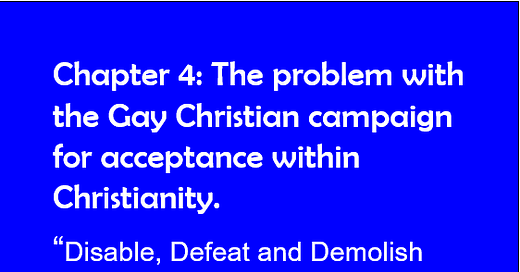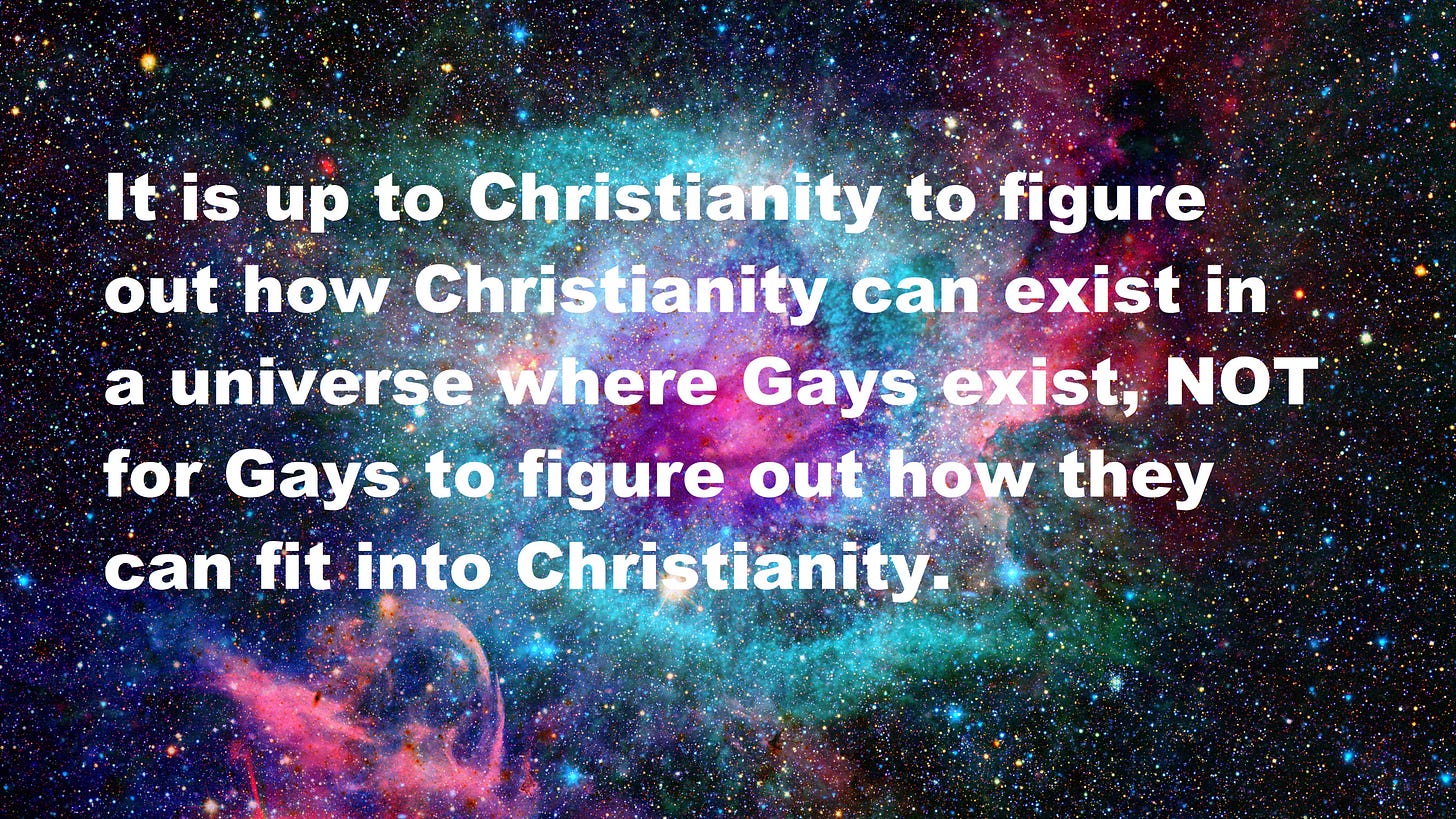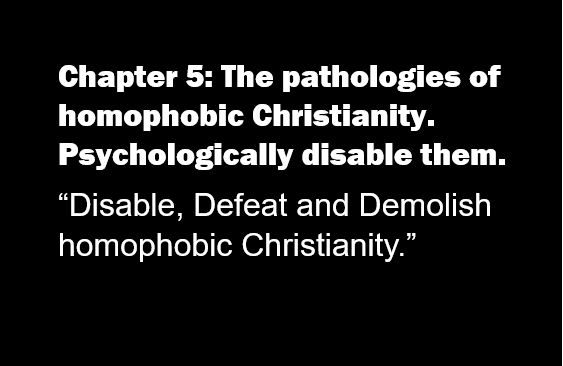Chapter 4 -- The problem with the Gay Christian campaign for acceptance within Christianity. Updated.
The Gay Christian agenda serves their personal needs, not the needs of the Gay community.
Subscriptions are free.
Chapter 4 – The problem with the Gay Christian campaign for acceptance within Christianity.
Again, this is not to push the Gay Christians out of the Gay community. However, some of their efforts have a negative impact on the fight against homophobic Christianity.
Many have assumed that the agenda of Gay Christians is the agenda of the Gay community as a whole when it is only the agenda of Gay Christians.
Criticism of the agenda of Gay Christians has been sectarian and largely atheistic arguments against religious belief in general and the belief in god or gods. There hasn’t been critical thinking about how the Gay Christian agenda impacts the general Gay community and its limitations in fighting homophobic Christianity.
The agenda of Gay Christians is to find a place for Gays within Christianity. In the United States it has been mostly the Catholic and Protestant Christianities in which they were raised in. Whether that is an attainable goal or makes logical sense is often the sole consideration in judging the efforts of Gay Christians.
Both the Gay Christians and the largely atheist Gays that oppose them confine the question into whether being Gay is likely or possible to fit into Christianity or the very old argument of whether god or gods exist, an argument that will go on forever.
What needs to be our position is that we have a right to exist and that is the beginning and end of our thinking. We don’t accept any argument for our annihilation.
Whether Christianity is inherently homophobic or not is not our problem. Our goal is to not be victimized by Christian homophobia, not to save Christianity from homophobia, or reform them to not be homophobic. If Gay Christians want to undertake to save Christianity from homophobia or reform them not to be homophobic, that is their concern, but not necessarily the concern of the general Gay community.
Defending the Gay community from homophobic Christianity is our agenda regardless of consequences.
Arguing over the Bible
Something that Gay Christians do, and which is understandable from their perspective is to argue over whether the Bible says homosexuality is wrong. It is something that is necessary to their agenda, but pernicious to the welfare of the Gay community as a whole.
When persons argue over whether the Bible says homosexuality is acceptable or not, they make our right to exist contingent over the outcome of a theological argument. An argument, which like most theological arguments, is never ending and never resolved. It also gives Christians authority over whether we have a right to exist or not. If you are arguing on whether the Bible says Gays have a right to exist, you are also asserting that it is a question which the Bible is the determining authority.
It is a very adverse strategic place to argue also. Anti-Gay Christian activists are likely to have studied all the arguments that Gay Christians have and developed fairly good counter arguments and worked on developing more convincing arguments. They are very likely to be aware of what psychological weaknesses Gay Christians have.
It should be no wonder that there are Gays who decided to renounce being Gay since they have decided that their right to be Gay is based on arguing over the Bible.
The argument over whether the Bible allows homosexuality also greatly constrains the issue to be within Christianity, not our right to exist in a secular state.
Constraining the argument to about what the Bible justifies or condemns excludes other arguments which might be used against homophobic Christianity.
The Gay Christian doesn’t consider that homophobia in Christianity and homophobic elements in the Bible are evidence that Christianity is invalid. The Gay Christian is a Christian who argues from the assumption, a given, that Christianity is correct and therefore the problem is fitting being Gay into Christianity, not that perhaps Christianity itself isn’t valid.
Our position should be that, “If you religion is homophobic, it is invalid.” Our position should be that the homophobic elements in the Bible are evidences that the Bible is invalid as a moral source.
There are other options available for the general Gay community which the Gay Christians won’t consider.
Gays could raise questions about the validity of Christianity in general and highlight some of the Bibles weirder texts. Gays could discuss what are the psychological pathologies of those choosing a homophobic church or just Evangelical churches in general. Gays could point out that some of these religious groups are sociopathic. Gays could work to decenter Christianity in the American religious imagination to be instead just one speculation or belief among many.
When discussions arise over what might be done in defense of the Gay community, the discussion tends to get shutdown by Christians, Gay and otherwise, by shifting the argument into what is “real Christianity,” (“True Christianity is often used instead.) or what the Bible says.
There is no discussion of the historical record of Christianity, its propensity to engage in persecution or that globally the default of Christianity is homophobia. There is no discussion that there might be structural reasons in its texts and theology for it to be homophobic as its default state which it is overwhelmingly globally and historically. There is no discussion that there might be structural reasons for it to be an ongoing source of disorder and persecution in general, such as the wars of religion, the burning of witches, the burning of other Christians, the collusion with power to oppress the weak.
There is no discussion of what measures might be taken, what organizing might be done to fight back, instead there are sentimental statements about the Bible and Christianity, which aren’t providing protection for the Gay community and at best have made a few Christians, churches, and denominations, a small minority of global Christianity, not focus on targeting Gays.
When a Gay Christian starts going on about Leviticus, red dresses and shrimp, we should consider whether as Gays we have to have a response to every paragraph in every religious book on the planet that might apply to us. We might suggest that the Gay Christian mention the pro-slavery parts of the Bible, New and Old Testament and point out that all the branches of Christianity just wish these sections away with the same non-literal higher interpretation liberalism. Of course, that would be rather severe in impact on Christianity and the Gay Christian wants into the house and not bring it down. We don’t want into the house.
The Gay Christians generally have a begging posture and are weak. You can easily find churches with national identities in their names. There are Norwegian Lutheran Churches and Swedish Lutheran Churches in Minnesota. There are Korean, Chinese and other nationality named Baptist Churches. However, I will never forget the response to my referring to the Metropolitan Community Church (MCC) as a Gay church, and these alarmed voices all said, “It isn’t a Gay church, it is a church with a lot of Gays.” Even today MCC rejects being known as a Gay church.
Gay Christians talk about, “fighting hate with love,” to act out their own Christological dramas. This too comes up to shut down effective defenses against homophobic Christianity.
Too many and too often Gay Christians tend to have a tone of begging. Also, their aspiration is to be accepted back into their churches, not to criticize them.
When the notorious W.A. Criswell, of 1st Baptist Church in Dallas, notorious for his racism, his anti-Catholic attack on President John F. Kennedy, and his sermons about Gays dying of AIDS because of their sodomy died, there were numerous Gay Christians in Dallas who were published in the Gay paper, Dallas Voice, praising him on the most ridiculous and unfounded pretexts.
The Gay Christians insist on dragging the defense of Gays into the Bible and be contingent on some convoluted and contorted theological conflict which will never be resolved and enables homophobic Christians to have authority over us.
Gay Christians tend to overstate what little progress they have made. When Pope Francis stated that Gays shouldn’t be arrested, but it still was a sin, Gay Catholics were just ecstatic. However, it was 2023 when Francis stated this, not the 1970s. It should be a given that we shouldn’t be arrested and any church saying homosexuality is a sin attacking us. In 2023 the issue isn’t anymore whether we will be arrested, but will we be able to get married and not face discrimination in employment, housing, medical care, and other social rights and for religions whether we can be clergy or hold other offices.
Gay Christians don’t critically assess what their prospect are. Given that they are Christians as a given, they have to hope that the future will be successful. The rest of us can be more realistic in our assessments.
The campaign of Gay Christians for acceptance has had limited and mixed success, even though the Gay Christian groups have been operating since the 1970s two generations ago. The Gay Catholics are always saying that the Catholic church moves very slowly to explain the very minimal progress made. Small incremental progress is sometimes represented as some great accomplishment by Gay Christians whose expectations are very low. In the case of the United Methodist, the denomination is crumbling over the issue of Gays in 2023, and the Episcopalians had many churches leave over the issue of Gays. The current prospects for Gay Christians to eliminate or even substantially reduce homophobic Christianity are not good. This is not to say they haven’t made some progress, but it falls way short of what needs to happen.
The Gay Christian movement isn’t the solution to homophobic Christianity.
Gay Christians will not consider and are likely to oppose the multitude of possible actions that could be taken to fight homophobic Christianity and actions that are likely to be much more powerful in fighting homophobic Christianity since they involve or might involve challenging the legitimacy of homophobic Christianity. If some Gay Christian group or individual does get in the way or oppose effective action, they need to face strong criticism.
Gay Christians have another negative effect. They see heterosexual Christianity as the standard for living. Their fervent hope is to be accepted in heterosexual churches. They tend to think that if they adhere to heteronormative restricted lifestyles, monogamous relationships, and be the best middle-class person they can be, they will be accepted. There is a very strong tendency to be a Respectability Gay. They often are upset that some Gays aren’t respectability Gays. They tend to blame their lack of acceptance by straight Christians on other Gays. They tend to have a repressive attitude towards how Gays are. Gays who have an attitude that the homophobia is somehow the fault of the Gays who they don’t consider respectable, aren’t going to have a militant attitude towards homophobic Christianity, they are somewhat sympathetic to it. Gays who have a bundle of negative attitude towards other Gays aren’t going to have a fighting spirit. The Gay Christians that want to let their straight friends know that they don’t approve of Lil Nas X, are more in sympathy with the homophobic Christians than with the Gay community.
This isn’t to say that some Gay Christians won’t reconsider what they do in the future once our campaign is underway and hopefully will, but likely there will be self-imposed limits on what they can do as Gay Christians since they are Christians.
For us, we need to move beyond the arguments and tactics of the Gay Christians and not let their personal religious agendas restrain us.
We need to aggressively do what is necessary to protect the Gay community against homophobic Christianity.














